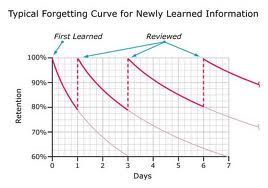Students sometimes take a bloody long time to learn. There have been blog posts about how progress doesn't necessarily demonstrate learning and blog posts arguing that progress isn't linear. Sometimes students might learn loads in my lesson; sometimes they might learn squat (hopefully not often). What my students need to do, however, is demonstrate that they can see the bigger picture in their learning and demonstrate that they are learning over time.
During one of my lessons recently, my year 9s were writing for the majority of the lesson as they were intent on showing me their learning over the module with the piece of work they were producing. Without that time to write, they would not be able to demonstrate their learning in a written format.
Before that, they had produced pieces of work, which I had given feedback on. These were pretty good pieces of work and demonstrated that they had embedded the skills from that lesson. However, they also demonstrated that they had forgotten the skills that we had worked on a couple of lesson before. Similarly, before that piece of work they had produced another piece of work that did have those skills embedded. So had they just decided to not use those skills in the second piece of work? No - they were demonstrating that they hadn't learnt that skill effectively yet.
My assessment of that first piece of work showed me that they had embedded those skills at that time, but they need to be able to embed those skills time after time when required. My assessment of the next piece of work showed me that this skill wasn't properly embedded so I could go back and go over those skills again. This was why they were then able to embed the skill in the next piece of work.
However, will they be able to embed that skill in their writing in six months?

There are lots of better posts than this about this concept, but what I am aiming for is my students to be able to embed these skills in six months, in six years and in sixty years (this might be stretching it). If I have to go back to that skill to help my students embed it, then so be it, but I want to space out the periods when I review this skill so my students have a better chance of retaining it.
This is why I am having to go back over multiple times what the students have learnt so far in the module. The picture above shows my learning objectives for the assessed piece of work lesson. After they had completed the work, the students rated what 'ski-slope learning objective' (see this post if you're confused!) they had achieved for every learning objective we had worked on over the module. This gave them a ready made success criteria for their assessed piece of work. I haven't marked these assessments yet, but I will be able to see:
- whether the students can accurately assess in their piece of work (they will star what they think they achieved for every learning objective studied in the module)
- whether they have actually achieved the learning objectives
- whether their work is showing signs of progression
The 'big picture' was a crucial part of the Cramlington Learning Cycle when I worked there and I often didn't dwell on this part of the cycle in my teaching - showing it once at the start and revisiting it once before the students tired of it. Now, I can see how important it is, especially to allow students to see that learning is a long process over time.
Although I can't promise that these assessments will demonstrate learning, what I can do is come back to these 'comprehensive' learning objectives for the module time and time again with the students to show them that they need to be doing all of these skills; not just a couple of them and in isolation. It is vital for the students to understand that there is a big picture to their learning and the skills must be embedded in their writing - they cannot just produce them in one piece of work and not produce them again.
If you've got any refinements or advice on the 'comprehensive learning objectives' or the idea of a big picture in general, please do leave a comment.

No comments:
Post a Comment